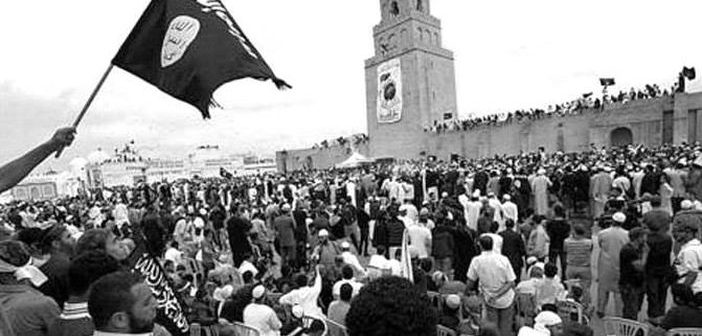In the last few years Tunisia has become part of the top 50 countries most impacted by terrorism.
As an illustration, among 11 million citizens, a Tunisian terrorist was behind the assassination of Shah Massoud in Afghanistan, another Tunisian terrorist was behind the Nice attack, a third Tunisian terrorist was behind the Berlin attack, Tunisian terrorists also were behind the mass destruction in Syria and Iraq, and Tunisian terrorists committed dozens of bloody attacks in Libya. Tunisian extremists are everywhere acting for different causes, interests and organizations.
Definitely, putting an end to the civil war in Syria, Iraq, Yemen or Libya means that waves of returnees will take the road home, also to Tunisia.
In the ground reality, stopping the war and establishing a political reconciliation there will be good in the sense that it will put an end to the massacres against innocent people but what can follow will be a real socio-political and legal problems in the small Tunisia that lacks the resources to welcome trained jihadist fighters used to living in conflict situations or suffering from psychological damage and post-traumatic stress disorder? What doubles the fear is that some developed countries have fallen victims of terrorist plots organized by returning fighters (France, Belgium, and Turkey)?
Initially, the extremely hard or the extremely tolerant security measures taken against radicals in Tunisia in the last two decades are among the important reasons behind the recidivism of former prisoners in terrorism cases, the transformation of radical youth to real terrorist actors and the travelling of all of these people in the direction of the conflict regions in Syria, Iraq, Yemen and Libya, or previously towards Afghanistan and Algeria. Furthermore, the actual counterterrorism law in Tunisia suffers of its inapplicability. It focuses basically on the penalties with a total absence of application measures. Additionally, the judiciary and security counterterrorist institutions in Tunisia are mainly single-sex institutions that neglect the role of women in the counterterrorism operations. Consequently, the examination of the cases related to female terrorism ignores the motivations behind women’s radicalization and the progressing roles and responsibilities of women in the radical violent groups today.
In order to be ready for facing the coming peril and to overcome the situation of byzantine political and media disputes, Tunisia needs to create an optimal de-radicalization strategy that includes the state institutions, the private sector, the civil society and the religious communities. Such a strategy shouldn’t be a retaliatory strategy of fear and punishment and it shouldn’t be a graceful strategy of ‘angry Muslims’ coming with bloody hands. It should address the real reason behind the “round trip” to and from Syria in a first step, the motivation factors behind the “exodus” of Tunisian youth toward Syria and the explaining reasons of their return, in order to determine later the suitable responses of punishment or the methods of reintegration for these returnees. After identifying the returnees and understanding their stories case by case, the process has to refer to the experiences of other countries that dealt with the same situation and the policies they took in similar cases.
For instance, the families of returnees can be an initial pioneer in a national de-radicalization program. Referring to the Algerian experience with the families of former terrorists, this experience engaged the narrow social circle of extremists in a national strategy and it mixed the personal goals of these families with the strategic targets of the government.
The goal of this strategy was “to increase the awareness of the families to prevent the radicalization of their children and to encourage the repentance of family members involved in extremist or terrorist activities”.
Learning from the northern neighbors, “an emergency hotline in France for reporting suspected jihadists has seen calls to the number double in January as concerned parents call for advice fearing their children may have been radicalized”.
In 2011, the European Union also created a Radicalization Awareness Network (RAN) that “brings together practitioners from around Europe working on the prevention of radicalization”. The RAN counts on the intention of the returnees and jihadists’ families to save their infected members, and it published a Declaration of Good Practices for Engagement with Foreign Fighters for Prevention. Going further the UN’s Interregional Crime and Justice Research Institute (UNICRI) and the Global Counterterrorism Forum (GCTF), basing on the GCTF’s Rabat Memorandum on Good Practices for Effective Counterterrorism Practice in the Criminal Justice Sector, established the Rome Memorandum on Good Practices for Rehabilitation and Reintegration of Violent Extremist Offenders.
If Tunisia doesn’t develop a strategy of prevention and containment of the fighters coming back from the conflict zones, they can reorganize their ranges and plan attacks inside the country; they also can affect and recruit new members and this can complicate the mission of the security apparatus and can destabilize the country and the entire region.
This strategy should be an effective strategy that addresses all the real and prospective terrorists. It should be a proactive and prevention strategy that averts the motivation factors of violence. Clearly, such methods and means need to be detailed and legalized in an applicable legal text.
Thus, this strategy should, also, address a deep change in the actual counterterrorism law to target the provisions of punishment and to include real measures in order to balance the situation. In addition, a gender approach is highly recommended in the analysis of the root causes of radicalization to see whether women have the same incentives of men to join extremist groups and violent conflicts or not. Decision-makers should take into consideration that some terrorist organizations recruit women with the intention of pressing or intimidating men and force them to be engaged.
Thus, the Tunisian counterterrorism law should be harmonized with the UN Security Council Resolution number 1325 of the year 2000. This resolution underlined the important role of woman in the operations of peace building and maintaining the involvement of women in the national and international institutions.
Furthermore, the former experiences could be adopted in Tunisia if the authorities can establish a call center for everyone to report the returnees and for returnees who want to be involved in reintegration programs in order to mitigate or escape the punishment.
The media, including TV, radio, internet, written press, movies and social media networks, can be a useful measure to make the radicalization a less attractive choice through a policy of de-legitimization of extremist’s thoughts and causes. Such policy “aims to deter unwanted behavior by discrediting the perpetrators in the eyes of their supporters”. This is to say that the fight against radicalization and extremism “is often believed to be a battle of perception and legitimacy”.
For this objective it would be obligatory to use eminent persons, including religious figures, as well as victims of terrorism, to strengthen public awareness, outreach and information campaigns.
These could work on promoting popular understanding, by women and men, that human rights for all are integral to cultural diversity and religious beliefs, not the opposite.






1 Comment
Que vient faire Kairouan dans cette histoire; ce rassemblement près de la mosquée Okba a eu lieu une seule fois.